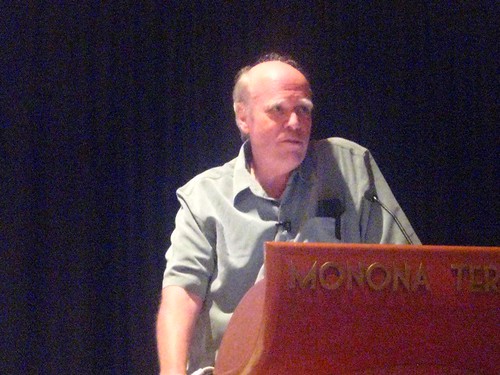This is probably one of the best keynotes I’ve ever attended (virtually in this case): inspirational, well structured and full of content and ideas. The speaker is Dr. James Paul Gee, a professor specialized in language, learning, and digital media, particularly video games. The event was the annual Games for Change Festival (June 20, 2012). Games for change is an organization that globally advocate for supporting and making games for social impact. I found this revealing presentation among the activities of the Games MOOC I follow.
Although the speech refers to game-based learning and games in general, professor Gee makes enlightening considerations about education, informal learning, nature of knowledge, among others. Before including the notes of the keynote, I would like to underline some quotations from his speech:
- “Education is not about producing people for the jobs that exist. […]. In education we try to produce a human being that can saved the world and count no matter where they are working.”
- “As a teacher you should involved in reforming the society, not only your school.”
- “Education is not about technology is about interacting people to be smarter than alone.”
- “It is core to a big G game that you have made people producers. You don’t empower people by just being consumers. Teaching people to read and not write, teaching people to play and not design is the way to make customer and consumers and not producer and thinkers. And we live in the age of fabrication.”

Gee highlights the importance of social interaction as part of the game experience. As Gee indicates “people play together as they share passion to solve a challenge”. He distinguishes between the little g game “game” and the big G game “Game”. He (2008: 24) defines both concepts as follows:
- “The “game” is the software in the box and all the elements of in-game design.”
- “The “Game” is the social setting into which the game is placed, all the interactions that go on around the game.”
A big G Game is the result of the creation of an Affinity Space plus a set of principles. Gee (2004: 67) defines an Affinity Space as “a place or set of places where people affiliate with others based primarily on shared activities, interests, and goals, not shared race, class culture, ethnicity, or gender” (quotation taken from Wikipedia). Somehow it constitutes an space for informal learning. This keynote presents the principles that make a big G Game.
(Note: all the items below are taken from the keynote. Sometimes I include comments or quotations from the speech of Dr. Gee):
- Collective Intelligence: output from groups smarter than output from individuals.
- Gamification: motivation and direction of attention.
- Smart Tools: agents and tools that store knowledge and teach.
- Crowd Sourcing: all contribution potentially count.
- Convergence: multiple media and tools should be well connected. Gee mentions the contributions of Henry Jenkins in this regards.
- Data Mining: copied data well represented. The Game should be design to collect, analyze and visualize all the information that the game itself generates. Social interactions need to be data-mined as well
- Assessment as developmental trajectory towards mastery. The gamers should be assessed and evaluated in their way to master the game.
- Standards: indigenous and models. Standards and rules should be open to change by the community of gamers.
- Distributed intelligence: intelligence stored in a network of tools and people.
- Emotional intelligence.
- Social intelligence.
- Embodied intelligence: tacit understanding.
- Situated understanding: words married to images and actions.
- Critical thinking: thinking strategically at a meta-level. All gamers ends thinking theoretically about the Game.
- Design thinking: thinking like a designer. “I don’t think you can play any game unless you think as a designer”.
- Systems thinking: multiple variables and unintended consequences.
- Model-based reasoning: science. Gee points out that critical thinking or model-based reasoning (as said in Science) are crucial in a Game.
- Innovation/Creativity.
- Literacy: articulation of tacit understanding.
- Problem solving: facts as tools. By resolving problems you get also the knowledge, the contents. Some interesting quotations of Dr. Gee follow: “That does not mean that facts are unimportant. What it means is that any factual teaching is taught as a tool for problem solving.” “If you keep teaching for facts you don’t get problem solving but If you teach for problem solving using the facts you get both.” “A game is not a game if it is not about problem solving.” “Don’t invest in education that is not about problem solving. All you get is a bunch of smart people doing stupid things.”
- Production/fabrication: modding mentality. “It is core to a big G game that you have made people producers. You don’t empower people by just being consumers. Teaching people to read and not write, teaching people to play and not design is the way to make customer and consumers and not producer and thinkers. And we live in the age of fabrication.”
- Cycle of Expertise: practice + routine mastery + challenge to that mastery.
- Preparation for Future Learning. Learning occurs in the Affinity Space (2004).
- Augment Reality (surmise new possibilities). Good games do change your brain to look at the world in a new way, to find new solutions.
- Adaptative Mentoring: guided, well designed, customized experience. Flexible, changing roles.
- Learning ecology: learning in lots of different ways and spaces. Rather than adapting the way of learning to the person, we should try to learn in different ways. The world won’t adapt to you. Also that’s not challenging to the individual.
- Remedial: repair past damage.
- Interest -> Passion
- Art: making strange. To make what we take for granted strange again. The purpose of art.
- Cultural models: challenge the taken-for-granted.
- Play/Flow
- Identity: being/agency/counting
- Complex System: games are a complex system, as complex as some of the most challenging phenomena in nature. It is not open to control study.
- Educational vision: Gee indicates that this vision, taken from a commercial, is more meaningful than other theoretical approaches to education: “The game is designed to change the way players approach, manipulate and surmise the possibilities in a given environment.”
Finally I’d like to include this quotation about knowledge and disciplines: “In a real big G game you are not learning a discipline, you are learning multiple skills, social and emotional intelligence, collective intelligence.”
References
- Gee, J.P. (2004). Situated Language and Learning: A Critique of Traditional Schooling. New York: Routledge, 2004.
- Gee, J.P. (2008). “Learning and Games.” The Ecology of Games: Connecting Youth, Games, and Learning. Edited by Katie Salen. The John D. and Catherine T. MacArthur Foundation Series on Digital Media and Learning. Cambridge, MA: The MIT Press, 2008. 21–40.

